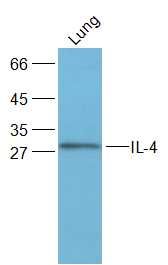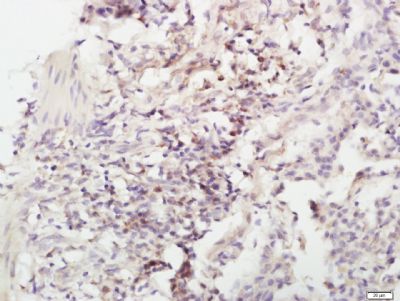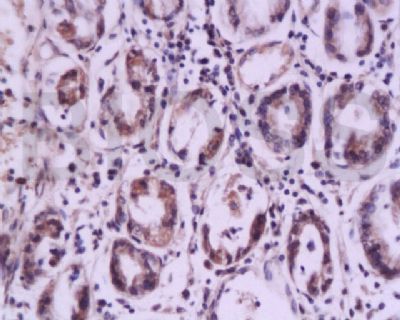[IF=3.033] Fang Wan. et al. Curcumin activates the Nrf2 Pathway to alleviate AFB1-induced immunosuppression in the spleen of ducklings. Toxicon. 2022 Apr;209:18 WB ; Duck.
[IF=5.89] Leyi Xue. et al. A Composite Hydrogel Containing Mesoporous Silica Nanoparticles Loaded With Artemisia argyi Extract for Improving Chronic Wound Healing. Front Bioeng Biotech. 2022; 10: 825339 IF ; Rat.
[IF=4.36] An Wang. et al. Yiqi Jiedu herbal decoction attenuates the 2 Gy 60Co γ ray induced spleen injury by inhibiting apoptosis and modulating the immune balance. J Ethnopharmacol. 2022 Mar;286:114925 IHC ; Mouse.
[IF=5.279] Jiuyan Zhang. et al. Lycopene Alleviates Chronic Stress-Induced Spleen Apoptosis and Immunosuppression via Inhibiting the Notch Signaling Pathway in Rats. J Agr Food Chem. 2022;XXXX(XXX):XXX-XXX WB ; Rat.
[IF=1.785] Ying Xue. et al. Application of TGF‑β1, TIMP‑1 and TIMP‑2 small interfering RNAs can alleviate CCl4‑induced hepatic fibrosis in rats by rebalancing Th1/Th2 cytokines. Exp Ther Med. 2021 Sep;22(3):1-7 WB,IHC ; Rat.
[IF=6.291] Si-Cheng Zhao. et al. Nickel sulfate exposure induces ovarian inflammation and fibrosis and decreases oocyte quality in mice. Ecotox Environ Safe. 2021 Nov;224:112634 WB ; Mouse.
[IF=3.647] Yang T et al. Berberine regulates macrophage polarization through IL-4-STAT6 signaling pathway in Helicobacter pylori-induced chronic atrophic gastritisLife Sci.2020 Dec 16;266:118903. WB、IHC ; Rat.
[IF=1.826] Fei W et al. The effects of aqueous extract of Maca on energy metabolism and immunoregulation. Eur J Med Res. 2020 Jun 29;25(1):24. WB ; Mouse.
[IF=1.851] Li G et al. Effects of combined treatment with PD‑L1 Ig and CD40L mAb on immune tolerance in the CBA/J x DBA/2 mouse model. Molecular Medicine Reports, 2020, 21, 1789-1798. WB ; Mouse.
[IF=1.396] Xiong Y et al. Functions of T-cell subsets and their related cytokines in the pathological processes of autoimmune encephalomyelitic mice.(2018) Int J Clin Exp Pathol;11(10):4817-4826. FC&IHC& ; Mouse.
[IF=1.64] Guo, Jie, Jiang Qian, and Rui Zhang. "Histopathology and immunohistochemical profile in idiopathic dacryoadenitis." Current eye research 37.5 (2012): 365-371. IHSLCP ; Human.
[IF=1.64] Jie, Guo, et al. "Expression of interleukin-17 in autoimmune dacryoadenitis in MRL/lpr mice." Current eye research 35.10 (2010): 865-871. IHSLCF ; Mouse.
[IF=1.37] Yang, Xiao, et al. "Effect of Iodine Excess on Th1, Th2, Th17, and Treg Cell Subpopulations in the Thyroid of NOD. H-2h4 Mice." Biological Trace Element Research (2014): 1-9. IHSLCP ; Mouse.
[IF=1.72] Lu, Na-na, et al. "Gene Expression Profiles Underlying Selective T-Cell-Mediated Immunity Activity of a Chinese Medicine Granule on Mice Infected with Influenza Virus H1N1." Evidence-Based Complementary and Alternative Medicine 2014 (2014). WB ; Mouse.
[IF=2.639] Luo Q et al. Iron Overload Resulting from the Chronic Oral Administration of Ferric Citrate Impairs Intestinal Immune and Barrier in Mice. Biol Trace Elem Res
. 2020 May 28. WB ; Mouse.
[IF=3.69] Qingqing Chen. et al. Coptis chinensis Franch polysaccharides provide a dynamically regulation on intestinal microenvironment, based on the intestinal flora and mucosal immunity. J Ethnopharmacol. 2021 Mar;267:113542 IHC ; Rat.
[IF=3] Meng-Meng ZHANG. et al. Protective effect of Pai-Nong-San against AOM/DSS-induced CAC in mice through inhibiting the Wnt signaling pathway. Chin J Nat Medicines. 2021 Dec;19:912 IHC ; Mouse.
[IF=6.291] Shaofeng Wu. et al. The neuroprotective effect of curcumin against ATO triggered neurotoxicity through Nrf2 and NF-κB signaling pathway in the brain of ducks. Ecotox Environ Safe. 2021 Dec;228:112965 WB ; Duck.
[IF=5.249] Liang, Wei. et al. Polarized M2 macrophages induced by mechanical stretching modulate bone regeneration of the craniofacial suture for midfacial hypoplasia treatment. 2021 Sep 27 WB ; Rat.
[IF=13.273] Fangyu Qiao. et al. 4-Octyl itaconate modified demineralized bone matrix scaffold improves bone repair by regulating early inflammation. Chem Eng J. 2021 Dec;425:131490 WB,IF ; Rat.
[IF=7.328] Dongdong Yao. et al. Matrix stiffness regulates bone repair by modulating 12-lipoxygenase-mediated early inflammation. Mat Sci Eng SLCMater. 2021 Sep;128:112359 WB,IF,IHC ; Rat.
[IF=6.17] Chan Mo. et al. Mutual antagonism between indoleamine 2,3-dioxygenase 1 and nuclear factor E2-related factor 2 regulates the maturation status of DCs in liver fibrosis. Free Radical Bio Med. 2020 Nov;160:178 WB ; Mouse.
[IF=6.792] Xinran Li. et al. Fumonisins B1 exposure triggers intestinal tract injury via activating nuclear xenobiotic receptors and attracting inflammation response. Environ Pollut. 2020 Dec;267:115461 WB ; Mouse.
[IF=3.361] Hou DD et al. Anti-inflammatory effects of quercetin in a mouse model of MC903-induced atopic dermatitis. Int Immunopharmacol. 2019 Jun 7;74:105676. IHSLCP ; Mouse.
[IF=4.5] Qin et al. Intrapleural delivery of MSCs attenuates acute lung injury by paracrine/endocrine mechanism. (2012) J.Cell.Mol.Med. 16:2745-53 IHSLCP ; Rat.


